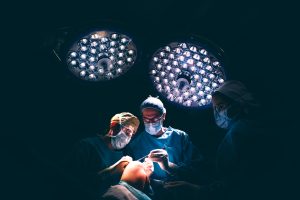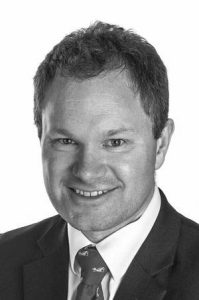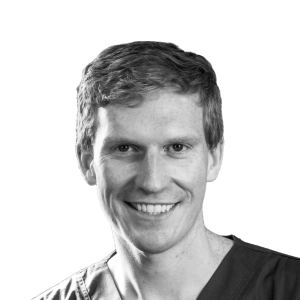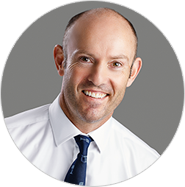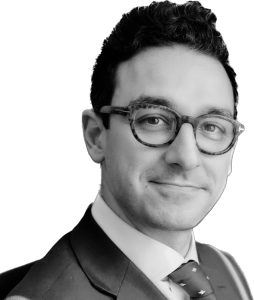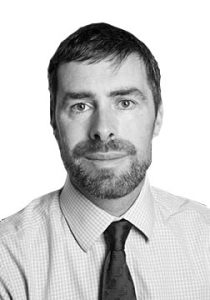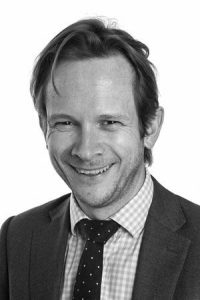Prof. McDonnell is an Associate Professor at the University of Cambridge and a Specialist Knee Surgeon working at Addenbrooke's Hospital. He has been a consultant for ten years, since 2013, having trained in centres of excellence within the UK and abroad.
He undertook his medical training at UCL in London and his surgical training in Oxford, based at the Nuffield Orthopaedic Centre. He has a strong research interest, undertaking his thesis at the Botnar Research Centre (Oxford) into early knee arthritis. He has a particular interest in partial knee replacements, which have lower risks from surgery and can provide a superior functional outcome for patients.
His international training was with the MOG (Melbourne Orthopaedic Group), one of Australia's largest specialist orthopaedic Groups. In 2018, I was awarded the British Association of Knee Surgeons Travelling Fellowship to New York and Boston to gain an international perspective on the latest knee preservation techniques.
Prof. McDonnell’s current practice is aimed at:
He has a special interest, and the majority of his knee joint replacements are knee resurfacings / partial unicompartmental knee replacements - only replacing the damaged area of the knee, which have lower risks from surgery and can provide a superior functional outcome for patients.
He believes that each patient should be prescribed a personalised package of care and treatment program. He has a keen interest in sport and has been the match orthopaedic surgeon for first-class rugby internationals, and has been a regular motorsports doctor at Silverstone for the Formula One British Grand Prix.
Prof. McDonnell is actively involved in research and education and lectures locally, nationally, and internationally. He is a reviewer for the Bone and Joint Journal, The Knee, and The British Journal of Sports and Exercise Medicine. He has developed the undergraduate orthopaedic curriculum and inspires orthopaedic medical students to be orthopaedic surgeons of the future.
When not at work, he is trying to improve at tennis.
In accordance with the requirements of the Competition and Markets Authority Private Healthcare Market Investigation Order (2014), private healthcare facilities must disclose any financial interests held by individual consultants within in the practice.
Stephen McDonnell has a financial interest in the practice as he holds a directorship position and a significant shareholding (>5%) in Momentm Health Limited; Momentm Health Limited owns all equipment.
Mr Mike Barrett is an expert orthopaedic and trauma surgeon who specialises in treating foot and ankle conditions including trauma, and sports injuries. Mike receives complex cases referrals from the across East Anglia and beyond. Vastly experienced, he is an excellent teacher and published author in his field. He is a consultant at Cambridge University Hospital, where he treats the most severely injured patients and challenging foot and ankle conditions. He teaches junior surgeons on a daily basis and is co-founder of the a international digital education platform orthohub.xyz.
Mr Barrett trained on the East of England orthopaedic rotation. During this time, he was awarded the Trainee of the Year, Trinity Cup (best in class), and the British Orthopaedic Foot and Ankle society gold fellowship awards. He completed fellowships in foot and ankle at the University Hospitals Dorset, and major trauma & limb reconstruction at the Royal London Hospital.
Mr Barrett’s treats all conditions of the foot and ankle including surgical and non surgical management of foot and ankle injuries, achillies tendon disorders, hallux valgus (bunions), arthritis of the toe / foot / ankle, flat foot deformity, ankle instability, peroneal tendon dysfunction, plantar fasciitis, and morton’s neuroma.
Mr Barrett has written book chapters on foot and ankle surgery for a Bailey and Love series, and authored several peer review publications.
Mr Barrett enjoys spending time with his wife and three young children. He enjoys running and cycling.
Mr Barrett receives referrals for expert input, or second opinions on complex foot and ankle problems.
I undertook my medical training at St Bartholomew’s Hospital in London and qualified as a doctor in 1990. Following this I did my initial general surgical training in London and Cambridge, where I worked for a year at Cambridge University, teaching Anatomy and undertaking research. My specialist training in Orthopaedics and Trauma was in Edinburgh.
At the end of my training I spent 3 months in Turin and 18 months in Toronto on a specialized Fellowship in Shoulder & Elbow surgery and Sports Surgery. This gave me particular exposure and experience to minimal access and keyhole surgical techniques and to the exacting demands and expectations of treating elite level athletes.
In 2002 I was appointed as a Consultant Orthopaedic Surgeon,specializing in shoulder and elbow surgery, at Addenbooke’s Hospital which is part of the Cambridge University Hospitals Trust. This is a large tertiary referral teaching hospital and a regional major trauma centre. In 2004 I became an Honorary Clinical Fellow of Cambridge University which is a world renowned academic institution.
Prior to going to University I undertook a Short Service Limited Commission in the British Army with the Blues & Royals. I served in the UK, Germany & Canada.REQUEST CONSULTATION
I am a shoulder and elbow surgeon and have a particular interest in arthroscopic (keyhole) surgery and continue to be involved in developing new techniques. I routinely undertake shoulder instability surgery (including arthroscopic bone block procedures), rotator cuff repairs (including biological patches) and arthroscopic elbow surgery. I also undertake routine shoulder replacements and fracture surgery.
I am particularly interested in the sternoclavicular joint and have pioneered and developed an arthroscopic surgical technique to manage certain conditions. I am also one of a few surgeons who undertake arthroscopic scapulothoracic surgery, mainly for a snapping scapula.
Over time my practice has evolved and, as well as seeing patients with routine shoulder and elbow problems, I also regularly see and operate on complex tertiary referral and revision patients.
I am very interested in sports injuries and see and treat sportsmen of all levels ranging from recreational to elite level athletes. I am the orthopaedic surgeon for the Cambridge University mens and womens Blues Rugby team.
Arman is a specialist knee surgeon at Cambridge University Hospitals (Addenbrooke’s). His work comprises the full spectrum of knee surgery, from sports injuries, to realignment, to joint replacement. He is involved in the management of severe trauma knee injuries which may require the reconstruction of fractures and multiple ligaments around the knee.
Arman’s particular area of interest, as well as fellowship training, is personalised knee replacement. This is the matching of the alignment of knee replacement implants to the patient’s anatomy and alignment. The philosophy is termed kinematic alignment and has been shown to have better outcomes than conventional knee replacement.
Arman qualified in 2009, and spent his training years in centres of excellence in the UK and abroad. He completed his surgical training on the Cambridge rotation, in the East of England. Arman completed fellowship training at the Fortius clinic in London, treating knee injuries in elite athletes. The Fortius clinic is one of two centres in the UK that has FIFA accreditation. As a result, he has first-hand experience of treating high level sportsmen and women in a variety of sports, including rugby, football, skiing, Judo and more. Arman is one of a handful of surgeons in the East of England region who can perform multiple ligament reconstructions.
Arman has also completed a fellowship in Oxford, gaining skills in partial knee replacement, revision knee replacement (re-do surgery), as well as kinematic alignment (personalised knee surgery). He was also awarded a prestigious travelling fellowship from the BOA (British Orthopaedic Association) to visit centres in the USA, including Chicago and Philadelphia (Rothman Orthopaedic Institute).
Arman spent six months in Leeds Teaching Hospitals, treating patients with severe traumatic injuries, as well as cartilage regenerative surgery, including stem cell treatments. At CUH, he treat multiply-injured patients, who are referred from around the East of England region.
Arman was awarded a number of prizes during his training, including the Trinity Cup for the most accomplished trainee, Cambridge Trainee of the Year and a research grant from Addenbrooke’s Charitable Trust. This grant is being used to investigate the effect of pre-operative muscle strength on the outcomes of arthroscopy (key-hole surgery).
Arman is also heavily involved in orthopaedic research, with the aim of improving the outcomes of surgery for patients. He has published a number of articles on the importance of muscle strength for better surgical outcomes. At CUH, he leads on the development of the enhanced recovery programme, to ensure patients return to independence as soon as possible for them.
Although he have a strong surgical pedigree, he is also acutely aware of the need for non-operative measures. This includes a holistic approach to patients, and offering alternatives to surgery such as injections, targeted physiotherapy, as well as the use of braces and splints when indicated.
Arman have three children and enjoys watching, and sometimes playing, a variety of sports, including rugby, football and skiing.
My medical training began in 1990 at Cambridge University where I graduated with a 2:1 Bachelor of Arts degree in Medical and Neurosciences in 1993. I continued clinical training at Addenbrooke’s Hospital graduating in 1995 with Bachelor of Medicine and Surgery degrees. I continued surgical training and was made member of the Royal College of Surgeons of England in 2000. My specialist training in Orthopaedics followed during which I was made Fellow of the Royal College of Surgeons of England in Trauma and Orthopaedics in 2007 and completed research leading to the award of MD from the University of East Anglia in 2008. In the same year I was included on the GMC Specialist Register and was appointed Consultant Orthopaedic Surgeon at Addenbrooke’s Hospital in Cambridge in 2009. My current clinical practice includes emergency, or urgent, treatment of patients with all aspects of orthopaedic trauma, reconstruction after the same and elective treatment of conditions affecting the upper limb.
I specialise in treatment of conditions of the upper limb, especially of the hand and wrist. Common procedures include carpal tunnel decompression, trigger finger release; trapeziectomy and other operations for hand and wrist osteoarthritis, and treatments for Dupuytren's contracture. I also undertake treatments for traumatic conditions including fixation of wrist fractures (distal radius and scaphoid) and reconstruction following these injuries (osteotomy for distal radius malunion and bone grafting and fixation for scaphoid non-union). The British Society for Surgery of the Hand (BSSH) collects surgeon-specific outcome data for trapeziectomy and my scores are better than the national average compared with all other contributing hand surgeons in the UK. Similarly my BSSH scores for Dupuytren's surgery are on par for the national average.
In total over the past 6 years, I have performed or supervised approximately 3500 operative procedures, or just under 600 operations annually. Within this, on average per year, are 95 carpal tunnel decompressions, 12 trapeziectomies; 65 Dupuytren's procedures, 20 trigger digit releases, 11 scaphoid procedures (acute fixation or treatment of non-union) and 35 procedures for distal radius fracture.
I have held the role of clinical lead for Upper Limb services in Cambridge University Hospitals NHS Trust since 2014. I work as part of the executive management of the Orthopaedic department to streamline service delivery both in upper limb elective work and provision of trauma on-call cover; workforce planning and allocation is a key part of this role. This links in also with my position as deputy director of the regional Orthopaedic registrar training rotation. This role encompasses designing and implementing the regular instructional sessions and annual assessment of trainee progress towards their completion of training.
Between 2012 and 2015 I have held the position of Caldicott Guardian for Cambridge University Hospitals NHS Trust. This role involves acting as patient-centred "conscience" for the organisation and links in with Information Governance trying to steer a course balancing patient confidentiality and information sharing for patients' benefit. I have lectured on this topic both locally and recently at the British Orthopaedic Association annual congress, alongside Dame Fiona Caldicott herself. In addition I am an associate lecturer in Orthopaedics at the University of Cambridge and contribute to the undergraduate curriculum in terms of lecture delivery, work experience in clinic and operating theatre, and in projects for students to study in depth and put forward for publication or presentation at international meetings.
I maintain my up to date knowledge base by acting as faculty for two major international courses: the BSSH Instructional Series, which provides a complete curriculum for postgraduate hand surgery for senior trainees and Consultants and on the AOUK Advanced Principles in Fracture Management course, arguably the best specialist fracture fixation course in the world, again aimed at senior orthopaedic trainees and Consultants. In addition I co-organise and deliver the Cambridge University School of Clinical Medicine course for the medical students in Orthopaedics and direct the East Anglian specialist trainees' 9-term lecture circuit in Orthopaedics. Finally, I am regular faculty on several regional Orthopaedic courses.
I maintain my up to date knowledge base by acting as faculty for two major international courses: the BSSH Instructional Series, which provides a complete curriculum for postgraduate hand surgery for senior trainees and Consultants and on the AOUK Advanced Principles in Fracture Management course, arguably the best specialist fracture fixation course in the world, again aimed at senior orthopaedic trainees and Consultants. In addition I co-organise and deliver the Cambridge University School of Clinical Medicine course for the medical students in Orthopaedics and direct the East Anglian specialist trainees' 9-term lecture circuit in Orthopaedics. Finally, I am regular faculty on several regional Orthopaedic courses.
Mr Chris Gooding is a Consultant Orthopaedic and Trauma Surgeon at Addenbrookes Hospital, Cambridge with a subspecialist interest in hip and knee surgery. He is also an Associate Lecturer to the University of Cambridge with a particular interest in undergraduate teaching. He completed his specialist training on the NE Thames Training program. During his training program he completed an MD on the clinical and histopathological review of patients who had received cartilage transplants in the knee. He achieved the FRCS Tr and Orth in 2008. He gained additional fellowship experience in Vancouver Canada, San Diego USA, Royal National Orthopaedic Hospital, Stanmore and an AO Fellowship in trauma in Berlin. During his fellowships he gained considerable experience in patients with complex joint problems particularly in revision arthroplasty. He also has a keen interest in sport and is a pitch side medic to Cambridge Rugby. He is widely published in a number of peer reviewed Journals and has presented at a number of national and international meetings. He is an Editorial Board Member for the Bone and Joint 360 and is a reviewer for the Bone and Joint Journal. Mr Gooding believes in delivering a patient centred approach of care which is evidence based.
